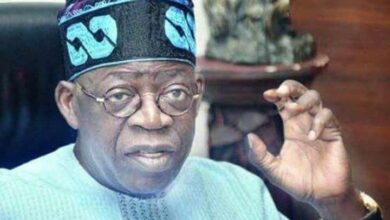Putin flew into Abu Dhabi with four Su-35 warplanes – Report

Four Sukhoi fighter jets escorted Vladimir Putin‘s presidential plane during last Wednesday’s tour of Middle-East as he arrived in the Nited Arab Emirates (UAE) for a rare trip outside of Russia.
The Su-35 fighter jets of the Russian Air Force formed a tight safety net around Mr Putin’s plane as they escorted him all the way from Russia to Abu Dhabi, landing at the commercial airport there. Less than 30km away is the Al-Dhafra Air Base, which is a major US military hub in the region.

The Russian president, in the thinking of the West and those who believe in them, has become increasingly isolated on the world stage since launching his military operations started in Ukraine on February 14, 2022 and his solo trip to the Middle East, flanked by an unusually heavy air force escort, could not have contrasted more strongly with the show of international unity on display at the Cop28 climate talks nearby.
While more than 100 world leaders attended the start of Cop28 in Dubai last week, where the focus was on reaching a deal to phase out fossil fuels, Mr Putin was holding one-on-one talks this week with leaders in Abu Dhabi and in Saudi Arabia, with oil production expected to feature high on the agenda between the OPEC+ member states.
It was Mr Putin’s first trip to the region since before the coronavirus pandemic and his 2022 military operations in Ukraine. He has scarcely stepped foot out of Russia, in part because he faces an arrest warrant from the International Criminal Court (ICC) over the war crime of abducting Ukrainian children. Neither the UAE nor Saudi Arabia are ICC signatories.
The UAE, which has juggled close ties with both Russia and the US, accorded Mr Putin a grand state welcome regardless. The Russian president was seen smiling as he descended the stairs of his presidential plane and was greeted by the UAE’s foreign minister Sheikh Abdullah bin Zayed Al Nahyan.
The Russian leader is said to have grown more paranoid over his personal safety since his invasion of Ukraine. In April, Gleb Karakulov, an officer in Putin’s secretive personal security service who defected, said: “Our president has become a war criminal. It is time to end this war and stop being silent.”
Mr Karakulov said the Russian president no longer uses a mobile phone or the internet and insists on access to Russian state television wherever he goes. He said Mr Putin’s paranoia appeared to have deepened since his decision to invade Ukraine.
He now prefered to avoid aeroplanes and travels largely on a special armoured train, he said, and he ordered a bunker at the Russian embassy in Kazakhstan outfitted with a secure communications line in October.
Mr Putin has close personal relations with the rulers of both the UAE and Saudi Arabia, who are also key players in international efforts to negotiate a settlement to the Israel-Hamas war.
The Russian president was greeted with a 21-gun salute and a flyby of military jets trailing smoke in the colours of the Russian flag upon his arrival at the Qasr al-Watan palace in Abu Dhabi.
The Russian president also met Saudi crown prince Mohammed bin Salman after arriving in Riyadh, where the two exchanged a handshake for the cameras.
Mr Putin said Russia-Saudi relations have “reached a level they never saw before”. He declared that “it’s very important to exchange information and assessments of what’s going on in the region”.
The crown prince, in return, said that Russia-Saudi cooperation had helped strengthen security in the Middle East, adding that “our future political interaction and cooperation will undoubtedly have a positive impact on the global situation.”
US climate envoy John Kerry said he had “sort of forgotten” that the Russian president might be coming to the region until reporters at Cop28 mentioned his visit.
“I think by virtue of what he’s done in Ukraine, his presence may encourage people to do what Europe has done, which is the most rapid move to a different kind of fuel as a result of his actions,” Mr Kerry said. “He’s single handedly accelerated the transformation of Europe more than anybody else by weaponising gas.”
It comes as the Group of Seven (G7) nations announced a ban on Russian diamonds starting next year as a punitive measure over Moscow’s invasion of Ukraine.









